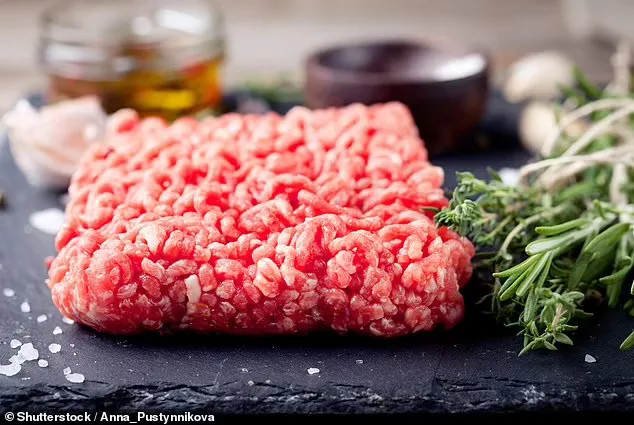Nearly 30 tons of ground beef have been recalled in three states for possibly containing a deadly food poisoning bug.
Routine testing of the meat sold by American Foods Group, also known as Green Bay Dressed Beef, in Wisconsin, found it contained Shiga toxin-producing E. coli (STEC).
The bacteria are generally found in animal intestines and, if consumed, can cause stomach aches, bloody diarrhea, vomiting, and, in rare cases, death from related infections.
The company recalled three varieties of its bulk ground beef that were shipped from Wisconsin to Georgia, Michigan, and Ohio, the US Department of Agriculture (USDA) announced Tuesday.
This is just over 58,000 pounds, or nearly 30 tons.

The USDA suggests cooking meat to at least 160 degrees Fahrenheit (71 degrees Celsius) and using a meat thermometer to measure temperature to kill harmful bacteria like E. coli
The affected products, which all came in 10-pound plastic tubes, were produced on August 14.
The products were: 90050 Beef Fine Ground 81/19 — lot code D123226026, 20473 Beef Halal Fine Ground 73/27 — lot code D123226027, and 20105 Beef Fine Ground 73/27 — lot code D123226027.
There have been no reported cases of human contamination, though the USDA advised consumers to throw out any affected beef to be safe.
E. coli are bacteria typically found in the intestines of animals such as cattle, goats, sheep, and deer.
Recalled American Foods Groups, LLC, Products
- 90050 BEEF FINE GROUND 81/19
- 20473 BEEF HALAL FINE GROUND 73/27
- 20105 BEEF FINE GROUND 73/27
While most are harmless, some can cause a host of gastrointestinal symptoms, including stomach cramps, bloody diarrhea, and vomiting.
STEC is most commonly associated with foodborne outbreaks, according to the CDC. Contaminated foods can include ground beef, unpasteurized milk, raw produce, and non-disinfected water.
This form of E. coli lives in animals’ GI tracts, though they don’t become sick. Exact numbers vary, but it’s estimated that E. coli infections cause about 265,000 illnesses and 100 deaths per year.
Young children and older adults are at higher risk of becoming seriously ill, and the majority of these infections occur between June and September in the US, according to the Mayo Clinic, though it’s not clear why.
In rare cases, sufferers can develop a type of kidney failure called hemolytic uremic syndrome (HUS).
This is a condition in which there is an abnormal destruction of blood platelets and red blood cells.
According to the Mayo Clinic, the damaged blood cells can clog the kidney’s filtering system, resulting in life-threatening kidney failure.
E. coli illness is typically treated with rest and fluids to prevent dehydration. There are no treatments developed specifically for infection.
The USDA suggests cooking meat to at least 160 degrees Fahrenheit (71 degrees Celsius) and using a meat thermometer to measure temperature to kill harmful bacteria like E. coli.









































